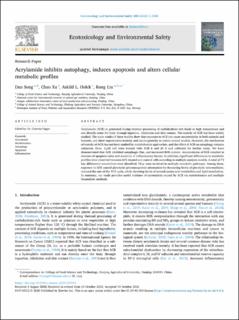| dc.description.abstract | Acrylamide (ACR) is generated during thermal processing of carbohydrate-rich foods at high temperature and can directly enter the body through ingestion, inhalation and skin contact. The toxicity of ACR has been widely studied. The main results of these studies show that exposure to ACR can cause neurotoxicity in both animals and humans, and show reproductive toxicity and carcinogenicity in rodent animal models. However, the mechanism of toxicity of ACR has not been studied by metabolomics approaches, and the effect of ACR on autophagy remains unknown. Here, U2OS cell were treated with ACR 6 and 24 h and collected for further study. We have demonstrated that ACR inhibited autophagic flux, and increased ROS content. Accumulation of ROS resulted in increase of apoptosis rates and secretion of inflammatory factors. In addition, significant differences in metabolic profiles were observed between ACR treated and control cells according to multiple analysis models. A total of 73 key differential metabolites were identified. They were involved in multiple metabolic pathways. Among them, exposure to ACR caused glycolysis/gluconeogenesis attenuation by decreasing levels of glycolytic intermediates, reduced the rate of the TCA cycle, while elevating levels of several amino acid metabolites and lipid metabolites. In summary, our study provides useful evidence of cytotoxicity caused by ACR via metabolomics and multiple bioanalytic methods. | |
